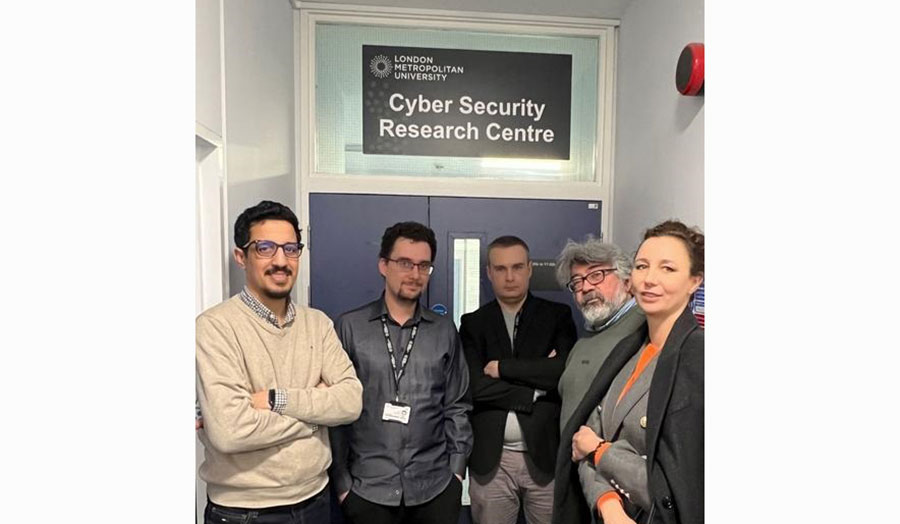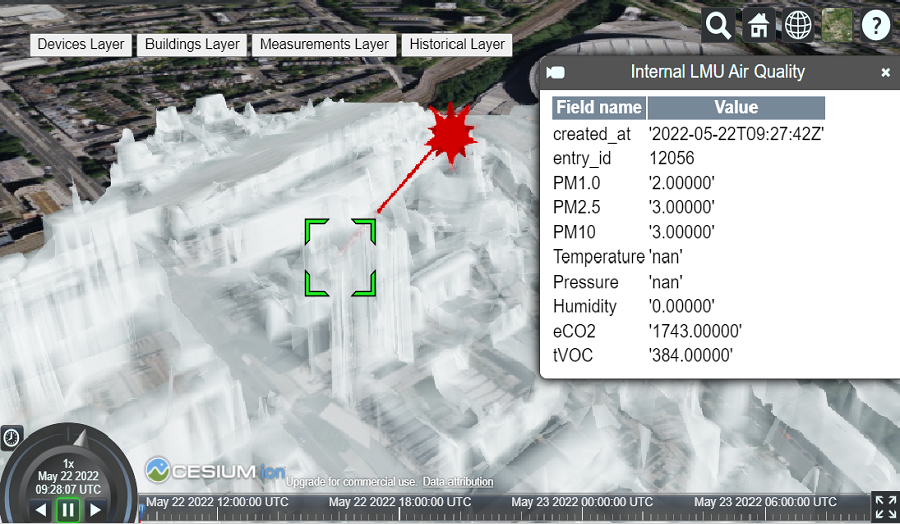Apply for this course
Please select when you would like to start:
If you're a UK applicant wanting to study full-time starting in September, you must apply via UCAS unless otherwise specified. If you're an international applicant wanting to study full-time, you can choose to apply via UCAS or directly to the University.
If you're applying for part-time study, you should apply directly to the University. If you require a Student visa, please be aware that you will not be able to study as a part-time student at undergraduate level.
Why study this course?
This is a top-up version of our Cyber Security and Forensic Computing BSc degree. A top-up degree is the final year (Level 6) of an undergraduate degree course and is for those who have a foundation degree, Higher National Diploma or equivalent qualification, or those wishing to study the final year of their degree in London.
The Cyber Security and Forensic Computing (Top-up) BSc is an inclusive course that has a strong focus on cyber security and forensic investigation, expanding on the career led BSc programme. You'll have the opportunity to develop skills in cyber security technology, which will lead to an undergraduate degree completion and an entry into the professional world that it brings.
Strong performance indicators
Continuation rate = 85%, 1st and 2:1 = 60%, Graduate Outcomes = 60%
Learn from industry professionals
Throughout the course you’ll be supported by highly-qualified teaching staff who have strong links with the industry and potential employers
Accredited by the BCS
Our Digital Forensics and Cyber Security BSc degree has been accredited with full CITP status by BCS, The Chartered Institute for IT
Course modules
The modules listed below are for the academic year 2024/25 and represent the course modules at this time. Modules and module details (including, but not limited to, location and time) are subject to change over time.
Year modules
Digital Investigation and E-Discovery
This module currently runs:all year (September start) - Monday morning
(core, 30 credits)
Digital crimes are becoming far more sophisticated and harder to fight against. Therefore the need for educating cybersecurity, investigation, and e-Discovery professionals is more critical than ever-there is a large talent gap for people with these skills. It is imperative to explore advanced detective and preventive technology in combating the ever-changing digital and cybercrimes. This module provides knowledge of how to detect and prevent digital crimes and cyber incident at both law enforcement and corporate level. In this module, students are also prepared for their career as a professional working in Cyber security and notably the digital investigation and e-discovery domains. It provides students with practical knowledge and skills needed to succeed in the external exam from the certification of CompTIA Security+.
Read full detailsEthical Hacking
This module currently runs:spring semester - Thursday morning
(core, 15 credits)
This module is designed to develop understanding, knowledge and skills associated with the various malicious hacking attacks targeting computer systems and the appropriate safeguards needed to minimise such attacks.
The module aims are to:
1.Provide students with knowledge and understanding of the various hacking methods used in attacking computer systems and networks.
2.Enable students to use appropriate tools and techniques to identify, analyse, evaluate and test computer security vulnerabilities prone to hacking attacks, and develop appropriate procedures, solutions and countermeasures to defend and minimise such attacks.
3.To develop students’ awareness of ethical, professional, and legal issues connected with hacking.
4.Develop students’ knowledge, transferable skills and confidence in the subject leading to further academic and professional progression in this area.
Read full detailsNetwork and Cloud Security
This module currently runs:all year (September start) - Wednesday morning
(core, 30 credits)
This module aims to provide students with a critical understanding of security threats against network and cloud computing systems and the security measures designed to protect such systems. The module will explicitly develop students’ knowledge and experience in the design and application of network and cloud security solutions. The module will also equip students for further academic study and future employability in the area of cyber security.
Assessment: Group Coursework (50%) and Examination (50%) -Pass on aggregate
The key skills and knowledge to be gained are:
Students to develop a critical understanding of the principles and technologies employed in the protection of computers and their networked communications systems from security threats.
Read full detailsProject
This module currently runs:all year (September start) - Wednesday afternoon
(core, 30 credits)
The module enables students to demonstrate their acquired knowledge and skills through a systematic and creative investigation of a project work in accordance with their course requirements. The topic of investigation will cover a broad spectrum of various analysis and techniques and will lead to a comprehensive and concise academic/industry-related report. Students will be assisted in exploring areas that may be unfamiliar to them and encouraged to develop innovative ideas and techniques. Students will be able to choose a project that may require the solution to a specific problem, creation of an artefact in a real-world environment or an investigation of innovative ideas and techniques related to an area within their field of study. Collaboration with outside agencies and projects with industrial, business or research partners/ sponsors will be encouraged.
Assessment: Project Report Interim Submission(25%) + Project process (25%) + Project Report Final Submission(40% -Pass on component) + Viva (10% -Pass on component).
The module aims to develop a wide range of subject specific cognitive abilities and skills relating to intellectual tasks, including practical skills and additional transferable skills of a more general nature and applicable in many other contexts.
Particularly, the module aims to:
•Provide an opportunity to learn, through supervised experience, how to plan and carry out a project through a systematic and creative approach;
•Encourage innovation and originality in approach to investigating a problem in an area that may be unfamiliar to the student;
•Provide opportunity for in depth study of some specialised area of suitable scale and complexity relevant to their course of study;
•Raise awareness in potential business development opportunities in connection to the project work undertaken and of any ethical, legal and professional issues;
•Develop reporting skills as well as the ability to communicate results, conclusions, and the knowledge and rationale underpinning these, to specialists and non-specialist’s audiences, clearly and unambiguously;
•Encourages reflection upon the relationship of design decisions to the appropriateness of the finished task;
•Enhance professional and personal development.
Read full detailsCareer Development Learning
This module currently runs:spring semester - Wednesday afternoon
autumn semester - Wednesday afternoon
(option, 15 credits)
The module enables students to undertake an appropriate, short professional activity related to their course at level 6 with a business or community organisation and to gain credit for their achievements. The activity can be professional training or certification, a volunteering activity, employment through internal or external work-based placements, research-related activities, business start-up projects, entrepreneurship programs and more. Please see the complete list of accepted activities on WebLearn.
Students are expected to engage in any one or combination of career development learning activities for a total of ~70 hours which should be recorded clearly in a tri-weekly learning log – part of the portfolio. The ~70 hours can be completed in ~30 working days in FT mode or spread over a semester in PT mode.
Students are expected to complete a total of ~150 hours, 70 hours of which is direct engagement in any one or combination of career development learning activities. Progress should be recorded clearly in tri-weekly learning logs which are part of the portfolio. The ~150 hours can be completed in ~35 working days in FT mode or spread over a semester in PT mode.
Students should register for the module to be briefed, undergo induction and module planning and have their career development learning activity approved before they take up the opportunity. Students must be made aware that both the "Learning Agreement" (LA) and relevant "Health and Safety (H&S) checklist", where applicable, must be approved before starting the learning activity. Activities started without prior explicit supervisor approval will not be accepted.
The module aims to provide students with the opportunity to:
• Gain a valuable experience of the working environment and the career opportunities available upon graduation.
• Sharpen critical thinking, creative problem-solving and the ability to articulate solutions correctly to decision-makers and budget-holders alike.
• Undertake a career development learning activity appropriate to their academic level to gain exposure and access to professional networks.
• Extend learning experience by applying and building on their academic skills and abilities by tackling real-life problems through enrichment and extracurricular programs related to student subject areas.
• Enhance existing skills and master new ones through a structured personal and Professional Development Plan (PDP).
Project Analysis and Practice
This module currently runs:autumn semester - Thursday morning
(option, 15 credits)
The aim of the module is to explore how projects are analysed, developed and managed in a business setting and the types of project methodologies that are used. Students will engage in using a methodology such as Agile in a team setting to understand the different roles within the Agile methodology. The module will examine the role and value of UML and other project management tools. The module will use case studies to gain a deeper knowledge of how projects are analysed, developed and managed. The module will be assessed by means of a 3000 word report based on a chosen case study.
Read full detailsRisk, Crisis and Security Management
This module currently runs:autumn semester - Thursday afternoon
(option, 15 credits)
This module is in particular for those who wish to specialise in understanding, developing, and the application of IT security systems and measures in IT environments. It focuses on various aspects of security management and deals mainly with risk assessment, risk management, and standards and procedures. It provides students with an appreciation of the benefits security management provides within an information systems domain. This includes the choice and application of appropriate risk assessment and risk management techniques, coupled with an understanding of security standards and procedures.
This module is aimed at providing students with the understanding of security risks associated with information assets and the security programs designed to protect them from security threats. This module will focus on the identification of security risks, the application of risk control and risk management measures, the appreciation of security technology, and critical understanding of security policies, standards and practices. The legal, ethical, and professional issues in security management are also covered in this module.





.jpg)


.jpg)


















